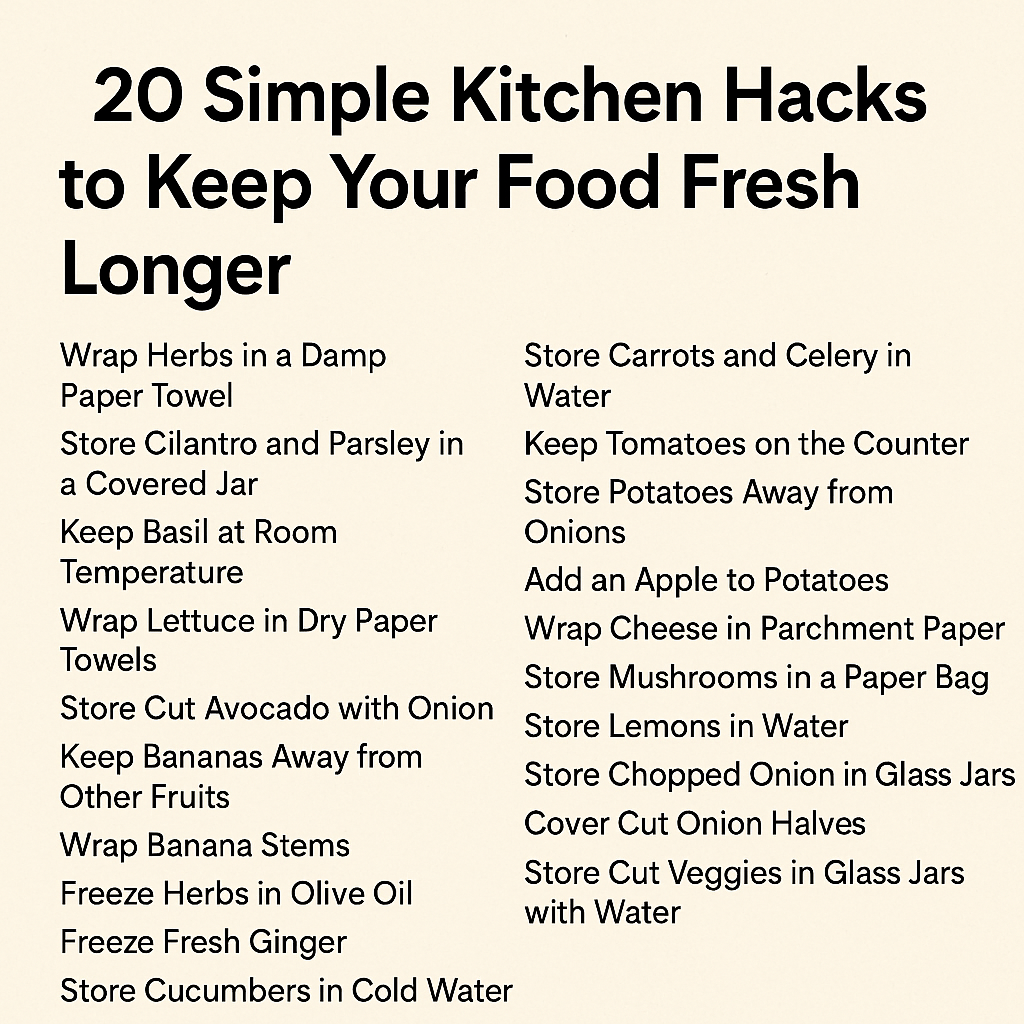Keeping food fresh doesn’t have to be complicated. A few clever tricks can save you money, reduce waste, and make sure your ingredients taste their best when it’s time to cook. From keeping herbs perky to making vegetables stay crunchy for days, these easy kitchen hacks are game-changers. Here’s a collection of 20 tried-and-true methods to keep your groceries fresh and ready to use.
ChatGPT a dit :
1. Wrap Herbs in a Damp Paper Towel
This trick keeps your herbs looking fresh and perky for days. Just wrap them in a slightly damp paper towel, then slip them into a plastic bag or airtight container and pop them in the fridge. I do this with parsley all the time, and it feels like magic when I grab a handful a week later and it’s still crisp.
2. Store Cilantro and Parsley in a Covered Jar
Cilantro and parsley love a little hydration. Place the stems in a jar with a splash of water, then cover loosely with a plastic bag before putting it in the fridge. It’s basically giving them a mini vase — I always feel like my fridge turns into a little herb garden when I do this.
3. Keep Basil at Room Temperature
Basil is a bit picky and actually hates the fridge. Instead, store it at room temperature in a glass of water, like a bouquet, and cover it loosely with a bag. I learned this after wondering why my basil kept turning black in the fridge — now it stays green and fragrant much longer.
4. Wrap Lettuce in Dry Paper Towels
If you hate soggy lettuce, this one’s for you. Place a couple of dry paper towels inside the bag or container with your lettuce to soak up excess moisture. I started doing this after too many sad salad nights, and now my lettuce stays crunchy all week.
5. Store Cut Avocado with Onion
To keep that leftover avocado from turning brown too fast, store it with half an onion in an airtight container. The sulfur compounds in the onion slow down browning. I used to waste so many avocados before I found this trick — now I actually enjoy my other half the next day.
ChatGPT a dit :
6. Keep Bananas Away from Other Fruits
Bananas give off ethylene gas that makes everything around them ripen faster. If you don’t want your apples or avocados to go soft too soon, keep bananas on their own. I started doing this and noticed my fruit bowl stopped turning into a mushy mess by midweek.
7. Wrap Banana Stems
Want bananas to last longer? Wrap the stems in plastic wrap or foil — it slows down the ripening process. I usually do this right after buying them, and it easily gives me a couple of extra days before they start spotting.
8. Freeze Herbs in Olive Oil
This is a game-changer for cooking. Chop fresh herbs, pop them into ice cube trays, fill with olive oil, and freeze. When you need them, just toss a cube into your pan — instant flavor boost. I love doing this with basil and rosemary for quick pasta nights.
9. Freeze Fresh Ginger
Peel your ginger and store it in the freezer, either whole or pre-grated. It not only lasts for months but also grates like a dream when frozen. I do this all the time and never have to deal with shriveled, forgotten ginger in the back of the fridge again.
10. Store Cucumbers in Cold Water
Keep cucumbers fresh and crisp by storing them in a container of cold water in the fridge. Change the water every couple of days. I swear this makes them taste like they were just picked — perfect for a refreshing snack.
ChatGPT a dit :
11. Store Carrots and Celery in Water
To keep carrots and celery crisp, place them in a jar or container filled with water in the fridge. Change the water every couple of days. I started doing this for quick snack prep, and it’s so satisfying to grab perfectly crunchy sticks all week.
12. Keep Tomatoes on the Counter
Tomatoes taste best when stored at room temperature, not in the fridge. Keep them on the counter until they’re fully ripe, then use them quickly. I used to toss mine in the fridge and wonder why they tasted bland — leaving them out really brings out that garden-fresh flavor.
13. Store Potatoes Away from Onions
Potatoes and onions don’t play well together — onions release gases that make potatoes sprout faster. I keep mine in separate baskets, and now I don’t have to throw out a bag of sprouted potatoes halfway through the month.
14. Add an Apple to Potatoes
If you want to slow down potato sprouting, toss an apple into the bag or bin with them. The apple releases a little ethylene gas that helps keep them fresh. This one sounded odd at first, but it actually works — I get more life out of my potatoes now.
15. Wrap Cheese in Parchment Paper
Cheese needs to breathe, and wrapping it in plastic can make it slimy. Use parchment or wax paper instead, then place it in a loose bag or container. I started doing this with my cheddar, and it stays firm and flavorful much longer.
16. Store Mushrooms in a Paper Bag
Mushrooms can get slimy fast if stored in plastic. Keep them in a paper bag in the fridge — the paper absorbs extra moisture and keeps them firm. Ever since I switched to this, I never have to toss a sad, slimy mushroom again.
17. Store Lemons in Water
Whole lemons last much longer if you store them submerged in water inside a sealed container in the fridge. I love this trick because I always buy lemons in bulk, and this keeps them juicy for weeks.
18. Store Chopped Onion in Glass Jars
Put chopped onion in an airtight glass jar to keep it fresh and to contain the strong smell. I used to hate opening my fridge and smelling onion — glass jars completely solved that problem.
19. Cover Cut Onion Halves
If you only used half an onion, place the cut side face-down on a small plate and wrap it with plastic wrap. It keeps it from drying out and prevents that onion smell from taking over your fridge.
20. Store Cut Veggies in Glass Jars with Water
For sliced bell peppers or carrots, store them in a glass jar filled with cold water in the fridge. Change the water every couple of days. This keeps them crisp and snack-ready — perfect for quick salads or lunchbox additions.
With these simple hacks, you can make your produce, herbs, and pantry staples last longer — and enjoy better-tasting meals. A little extra care goes a long way in preventing waste and saving money. Try adding one or two of these habits to your routine and you’ll see how much fresher your kitchen feels.


